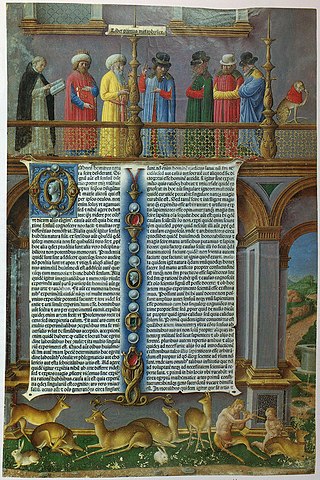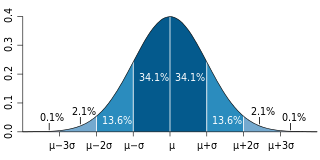Related Research Articles

Metaphysics is the branch of philosophy that examines the basic structure of reality. It is often characterized as first philosophy, implying that it is more fundamental than other forms of philosophical inquiry. Metaphysics is traditionally seen as the study of mind-independent features of the world, but some modern theorists understand it as an inquiry into the conceptual schemes that underlie human thought and experience.

Free will is the capacity or ability to choose between different possible courses of action.

Determinism is the philosophical view that all events in the universe, including human decisions and actions, are causally inevitable. Deterministic theories throughout the history of philosophy have developed from diverse and sometimes overlapping motives and considerations. Like eternalism, determinism focuses on particular events rather than the future as a concept. The opposite of determinism is indeterminism, or the view that events are not deterministically caused but rather occur due to chance. Determinism is often contrasted with free will, although some philosophers claim that the two are compatible.

William James was an American philosopher and psychologist, and the first educator to offer a psychology course in the United States. James is considered to be a leading thinker of the late 19th century, one of the most influential philosophers of the United States, and the "Father of American psychology."

Incompatibilism is the view that the thesis of determinism is logically incompatible with the classical thesis of free will. The term was coined in the 1960s, most likely by philosopher Keith Lehrer. The term compatibilism was coined to name the view that the classical free will thesis is logically compatible with determinism, i.e. it is possible for an ordinary human to exercise free will, even in a universe where determinism is true. These terms were originally coined for use within a research paradigm that was dominant among academics during the so-called "classical period" from the 1960s to 1980s, or what has been called the "classical analytic paradigm". Within the classical analytic paradigm, the problem of free will and determinism was understood as a compatibility question: "Is it possible for an ordinary human to exercise free will when determinism is true?" Those working in the classical analytic paradigm who answered "no" were incompatibilists in the original, classical-analytic sense of the term, now commonly called classical incompatibilists; they proposed that determinism precludes free will because it precludes the ability to do otherwise. Those who answered "yes" were compatibilists in the original sense of the term, now commonly called classical compatibilists. Given that classical free will theorists agreed that it is at least metaphysically possible for an ordinary human to exercise free will, all classical compatibilists accepted a compossibilist account of free will and all classical incompatibilists accepted a libertarian account of free will.

Hume's fork, in epistemology, is a tenet elaborating upon British empiricist philosopher David Hume's emphatic, 1730s division between "relations of ideas" and "matters of fact." As phrased in Immanuel Kant's 1780s characterization of Hume's thesis, and furthered in the 1930s by the logical empiricists, Hume's fork asserts that all statements are exclusively either "analytic a priori" or "synthetic a posteriori," which, respectively, are universally true by mere definition or, however apparently probable, are unknowable without exact experience.
Fatalism is a family of related philosophical doctrines that stress the subjugation of all events or actions to fate or destiny, and is commonly associated with the consequent attitude of resignation in the face of future events which are thought to be inevitable.
Compatibilism is the belief that free will and determinism are mutually compatible and that it is possible to believe in both without being logically inconsistent. As Steven Weinberg puts it: "I would say that free will is nothing but our conscious experience of deciding what to do, which I know I am experiencing as I write this review, and this experience is not invalidated by the reflection that physical laws made it inevitable that I would want to make these decisions." The opposing belief, that the thesis of determinism is logically incompatible with the classical thesis of free will, is known as "incompatibilism".

Libertarianism is one of the main philosophical positions related to the problems of free will and determinism which are part of the larger domain of metaphysics. In particular, libertarianism is an incompatibilist position which argues that free will is logically incompatible with a deterministic universe. Libertarianism states that since agents have free will, determinism must be false and vice versa.

Hard determinism is a view on free will which holds that determinism is true, that it is incompatible with free will, and therefore that free will does not exist. Although hard determinism generally refers to nomological determinism, it can also be a position taken with respect to other forms of determinism that necessitate the future in its entirety.

Charlie Dunbar Broad, usually cited as C. D. Broad, was an English epistemologist, historian of philosophy, philosopher of science, moral philosopher, and writer on the philosophical aspects of psychical research. He was known for his thorough and dispassionate examinations of arguments in such works as Scientific Thought (1923), The Mind and Its Place in Nature (1925), and Examination of McTaggart's Philosophy.

Ted Honderich is a Canadian-born British professor of philosophy, who was Grote Professor Emeritus of the Philosophy of Mind and Logic, University College London.
Predeterminism is the philosophy that all events of history, past, present and future, have been already decided or are already known, including human actions.
Peter van Inwagen is an American analytic philosopher and the John Cardinal O'Hara Professor of Philosophy at the University of Notre Dame. He is also a research professor of philosophy at Duke University each spring. He previously taught at Syracuse University, earning his PhD from the University of Rochester in 1969 under the direction of Richard Taylor. Van Inwagen is one of the leading figures in contemporary metaphysics, philosophy of religion, and philosophy of action. He was the president of the Society of Christian Philosophers from 2010 to 2013.
Theological determinism is a form of predeterminism which states that all events that happen are pre-ordained, and/or predestined to happen, by one or more divine beings, or that they are destined to occur given the divine beings' omniscience. Theological determinism exists in a number of religions, including Jainism, Judaism, Christianity, and Islam. It is also supported by proponents of Classical pantheism such as the Stoics and by philosophers such as Baruch Spinoza.
In philosophy, moral responsibility is the status of morally deserving praise, blame, reward, or punishment for an act or omission in accordance with one's moral obligations. Deciding what counts as "morally obligatory" is a principal concern of ethics.
Frankfurt cases were presented by philosopher Harry Frankfurt in 1969 as counterexamples to the principle of alternate possibilities (PAP), which holds that an agent is morally responsible for an action only if that person could have done otherwise.
The B-theory of time, also called the "tenseless theory of time", is one of two positions regarding the temporal ordering of events in the philosophy of time. B-theorists argue that the flow of time is only a subjective illusion of human consciousness, that the past, present, and future are equally real, and that time is tenseless: temporal becoming is not an objective feature of reality. Therefore, there is nothing privileged about the present, ontologically speaking.
Free will in antiquity is a philosophical and theological concept. Free will in antiquity was not discussed in the same terms as used in the modern free will debates, but historians of the problem have speculated who exactly was first to take positions as determinist, libertarian, and compatibilist in antiquity. There is wide agreement that these views were essentially fully formed over 2000 years ago. Candidates for the first thinkers to form these views, as well as the idea of a non-physical "agent-causal" libertarianism, include Democritus, Aristotle, Epicurus, Chrysippus, and Carneades.
Abilities are powers an agent has to perform various actions. They include common abilities, like walking, and rare abilities, like performing a double backflip. Abilities are intelligent powers: they are guided by the person's intention and executing them successfully results in an action, which is not true for all types of powers. They are closely related to but not identical with various other concepts, such as disposition, know-how, aptitude, talent, potential, and skill.
References
- ↑ "Arguments for Incompatibilism". Stanford Encyclopedia of Philosophy. Retrieved 3 March 2017.
- ↑ "Compatibilism". Stanford Encyclopedia of Philosophy. Retrieved 3 March 2017.
- ↑ Van Inwagen, Peter (1983). An Essay on Free Will. Clarendon Press. ISBN 9780198246244 . Retrieved 3 March 2017.